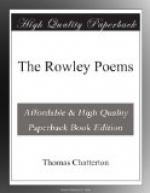When these Poems were first printed, it was thought best to leave the question of their authenticity to the determination of the impartial Public. The Editor contented himself with intimating his opinion, [Pref. p. xii, xiii.] that the external evidence on both sides was so defective as to deserve but little attention, and that the final decision of the question must depend upon the internal evidence. To shew that this opinion was not thrown out in order to mislead the enquiries and judgements of the readers, I have here drawn together some observations upon THE LANGUAGE[1] of the poems attributed to Rowley, which, I think, will be sufficient to prove, 1st, that they were not written in the XV Century; and 2dly, that they were written entirely by Thomas Chatterton.
The proof of the second proposition would in effect carry with it that of the first; but, notwithstanding. I choose to treat them separately and to begin with the first.
I shall premise only one postulatum, which is, that Poets of the same age and country use the same language, allowances being made for certain varieties, which may arise from the local situation, the rank in life, the learning, the affectation of the writers, and from the different subjects and forms of their compositions [2].
This being granted, I have nothing to do but to prove, that the language of the poems attributed to Rowley (when every proper allowance has been made) is totally different from that of the other English writers of the XV Century, in many material particulars. It would be too tedious to go through them all; and therefore I shall only take notice of such as can be referred to three general heads; the first consisting of words not used by any other writer; the second, of words used by other writers, but in a different sense; and the third, of words inflected in a manner contrary to grammar and custom.
Under the first head I would recommend the following words to the reader’s consideration.
1. ABESSIE. E. III. 89.
Whylest the congeon
flowrette abessie dyghte.
2. ABORNE. T. 45.
Snett oppe hys
long strunge bowe and sheelde aborne.
3. ABREDYNGE. AE 334.
Agylted AElla,
thie abredynge blynge.
4. ACROOLE. El. 6.
Didde speke acroole,
wythe languishment of eyne.
5. ADAVE. H. 2. 392.
The fynest dame
the Sun or moon adave.
6. ADENTE. AE 396. ADENTED.
G. 32.
Ontoe thie veste
the rodde sonne ys adente.
Adented
prowess to the gite of witte.
7. ADRAMES. Ep. 27.
Loughe loudlie
dynneth from the dolte adrames.
8. ALATCHE. AE 117.
Leave me swythe
or I’lle alatche.
9. ALMER. Ch. 20.
Where from the
hail-stone coulde the almer flie?




